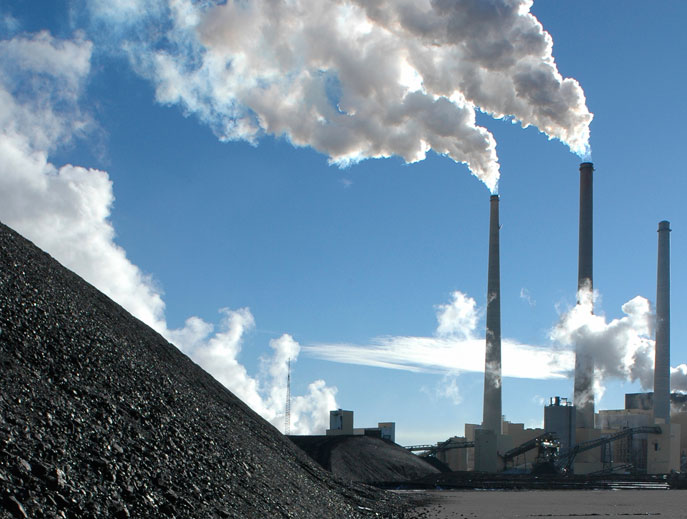This week FirstEnergy Solutions dropped a bombshell of an announcement -- it filed notice with the grid operator to retire four fossil fuel plants, including the two largest coal plants ever announced for retirement: Sammis and Bruce Mansfield. The announcement makes it clear that these coal plants are too old, dirty, and expensive to operate in a competitive market, and that’s the reason they should be retired. However, FirstEnergy Solutions’ announcement also included another plea to the Trump administration to force taxpayers and electricity customers to pay tens of billions of dollars to bail them out.
That’s a ridiculous proposition when you consider that it was FirstEnergy Solutions’ millionaire executives who brought the company to this point, after years of local complaints, lawsuits, and market realities had made their coal plants more costly. For example, the Bruce Mansfield power plant, northwest of Pittsburgh, is notoriously dirty and has used loopholes to skirt its responsibilities to operate and maintain pollution control equipment. As far back as 2012 the Little Blue Region Action Group, supported by the Sierra Club, Center for Coalfield Justice, and the Environmental Integrity project, has pushed to stop the plant from dumping its coal ash in an impoundment that was leaking and damaging nearby properties. They also challenged the plant over its dangerous air pollution in nearby communities.
In 2015, the Sierra Club, represented by Earthjustice, successfully appealed a permit to dispose of the plant’s ash at another leaking landfill after the closure of the notorious Little Blue site. We also worked with Clean Air Council, Clean Water Action, and other members of the Breathe Project to tighten state protections to reduce the plant’s smog-causing nitrogen oxide pollution by requiring the plant to actually run its pollution control equipment continuously, and ensure that its sulfur dioxide pollution did not cause dangerous violations of the Clean Air Act. Most recently, we compelled the state to issue an updated draft water permit that includes limits on heavy metals.
On top of all this, the Mansfield plant has been unreliable during cold weather events. In January, it suffered a massive scrubber fire that shut down two of its three units, and which remain idle to this day.
The Sammis coal plant in Jefferson County, Ohio, has become similarly uneconomic due to inexpensive wholesale power and the maintenance cost of keeping an aging coal plant running smoothly. As a result, since 2014, Sammis has been seeking a bailout, first from the state of Ohio and then the federal government.
In its first attempt, FirstEnergy tried to persuade the Public Utilities Commission of Ohio to force Ohio electricity customers to pay extra to keep the plant running. When electricity customers got wind of this, however, FirstEnergy Solutions ran into a wall of opposition across the entire spectrum of Ohio stakeholders, from customer groups to large manufacturers to environmentalists.
That plan finally died when the Federal Energy Regulatory Commission yanked a key permission for the plant, but FirstEnergy refused to learn its lesson and instead asked for regional and national bailouts for all of its coal and nuclear plants. As their former CEO Tony Alexander once said, "We will run the risk that we will get recovery of those costs in the market…. If it doesn’t, it’s our risk. Over time, maybe it will pay.”
Maybe not. Despite clean energy being cheaper and cleaner than its dirty coal plants, FirstEnergy Solutions has been one of the most hostile utilities in the country to solar and wind, and rather than makie a responsible transition to clean energy, it has run its uneconomic coal plants to the edge of a cliff out of hopes of a bailout from their customers or from Donald Trump.
The company's focus now should be on providing its workers with a transition to new economic opportunities -- not on asking the federal government to force taxpayers and electricity customers to spend tens of billions of dollars to bail out its old, expensive, uncompetitive coal plants. Its most recent announcement should also send a clear signal to the White House that attempts to save the coal industry aren’t going to work and that, instead of these false promises, our nation should be offering a meaningful economic transition for coal-impacted communities.
Recently, Trump has attempted to undermine clean air and water protections to placate his coal industry supporters by tossing out federal protections for coal ash, carbon pollution, and even the mercury standards that all the coal plants in the nation had already complied with. For that reason, FirstEnergy Solutions likely hopes this announcement will send a different signal to the White House, one that results in a Trump edict to bail out these uneconomic plants. But no amount of tweeting will slow the rise of clean energy or improve the economic fortunes of FirstEnergy Solutions' coal plants.
Trump’s rollbacks are running into major hurdles -- we just won a victory in court on the coal-ash standards, we’re on track to meet the targets of the Clean Power Plan a decade ahead of schedule, and federal regulators have so far rejected his coal bailout schemes. Renewable energy is now cheaper than coal, and Americans are demanding an end to fossil fuel pollution. The people and the markets have spoken, and we aren’t going backward. As the clock winds down on coal plants that can no longer compete in a 21st-century energy economy, let’s focus on a transitioning fossil fuel workers with dignity -- not on propagating false hopes.
